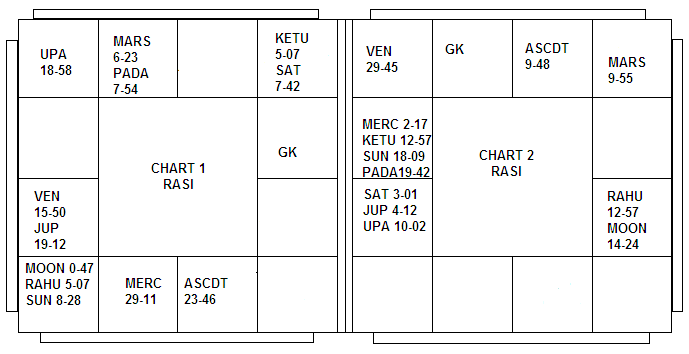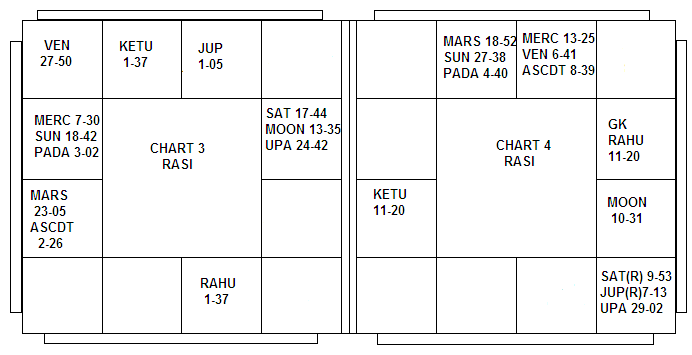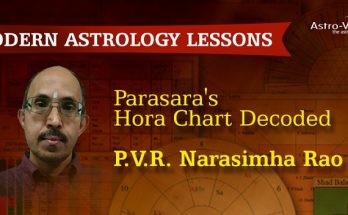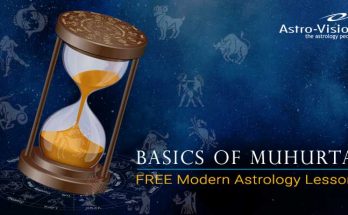The word Upa is a Sanskrit term meaning secondary. The terms Pada and Upapada can be equated with president and vice president respectively in terms of their implication and relative importance. If the Ascendant is the president whose Pada is the main Pada then we have to find out which house is next to it in importance and can rule the horoscope when the Ascendant is weak. Anuchara means follower of one or the next who posseses power in the absence of the primary one. It is also known as Gouna Pada signifying secondary status.
The word Pitra signifies the Ascendant according to the Katapayadi system. Now the question arises as to which house is the follower and next to the Ascendant in importance so that it can assume the role of the Ascendant in a horoscope. There are divergent views in this regard. Some takes it as the 2nd house and 12th house. It is difficult to find the correct Arguments in favor of the 2nd house are meaning of a Sutra. Every scholar has his own arguments and examples to prove his viewpoint .
The Jaimini system always prefers the 7th house in the case of the Ascendant being weak. The Upapada is seen for matters related to marriage. The basic concept of the Pada theory is that the Pada is referred to for matters related to the house whose Pada it is. So it is logical to study matters of marriage by the Pada of the 7th house. Upapada is seen for such matter which is why Jaimini indicates the 7th house by the word Anuchara.
Divergent Views
The second house signifies family, household (Kutumba) and finance. The 12th house rules loss, bed pleasures, sleep, secrecy (secret sin) and salvation.
Arguments in favor of the 2nd house are that word Pitra signifies the Ascendant as per Katapayadi system and Anuchara means follower, the next sign to come in the place of the Ascendant after time. One may have a family and household but this can be without marriage or wife. So the 2nd house cannot have such great importance regarding wife for which Jaimini has been describing a separate Pada as important as Pada of the Ascendant.
The 12th house is considered by some as it is the Anuchara or the follower being just behind the Ascendant (Pitra) just as a disciple remains behind the master. Though the 12th house is related to not only bed pleasures but also sleep or intimacy of a secretive nature (sin), Jaimini has assigned the matter of marriage to the 12th house as intimacy after marriage is socially accepted and not something secretive.
The argument in favor of the 5th house is Pitra being for the father, Anuchara indicating the son, the 5th house ruling the son can be considered but here both terms are not taken as per Katapayadi system.
The 5th house is mainly known for progeny, the fruit of marriage. How then can it be taken for both marriage and progeny!
The house where the Ascendant lord is placed is very important. But the word Anuchara does not reflect such importance. Hence we cannot adopt it for the purpose of Upapada though it could be a separate new method to examine a horoscope.
The oldest commentators of the Jaimini Sutras have taken the Pada of the 7th house for the purpose of Upapada in saying सप्त्मत्पदमुपदं (Saptmatpadmupadam) according to Dr. Suresh Chandra -Mishra in his Hindi commentary on the Jaimini Sutras. He himself, however, supports the Pada of the 12th house.
Some commentators take the word पित्र्यनुचरात् instead of पित्रनुचरात् and translate it to mean
the 7th house as per Katapayadi system as पित्रयानुचरात् depicts the numeral seven.
Determination of Pada
यावदीशासास्त्रयपदमृक्षाणां (1-1-29)
According to the definition of Pada: As far as a sign-lord is removed from its sign that far away is the Pada from the sign-lord.
Now the question is of the unit. Should it be in terms of signs or it in terms of longitude?
According to the following two Sutras of Jamini,
केन्द्र्त्रिकोनोपचयेशु द्वयोमैत्री ॥
The mutual disposition of the Padas of the Ascendant and the 7th house in Kendras, konas or in Upachayas is good increasing friendliness. If it is the 6th , 8th or the 12th from the Pada of the Ascendant, disharmony between the couple is feared.
If we count house-wise, only odd houses are possible as the Pada of the ascendant. So the 6th, 8th or 12th position from the Ascendant are not possible. Secondly we cannot examine further sub-divisions of a Pada. Hence longitudinal distance must be preferred to obtain a Pada of a a house with the following formula:
Pada= longitude of house lord – longitude of a house + longitude of house lord
The calculation of the house must be according to the method of Sripati for best results in my experience.
Some say the 1st and the 7th house are not eligible to attain the rank of the Pada. Instead of them the 10th and 4th houses are to be taken. this is not acceptable. Two Sutras in favor of this view are quoted but these Sutras are only example Sutras and not exceptions. These are no Sutras in favor of the 10th and 4th houses. See the related Sutras,
Only one word in a Sutra can be taken to draw out its hidden meaning according to the Katapayadi system. This is a general practical method in using Katapayadi system in Jaimini Sutras – refer to only one word in a Sutra. Hence both the words Swa and Dara or Sut and Janm cannot be considered. only one word in these Sutras Swa and Sut are subjected to the Katapayadi scheme. The word Swa signifies 4 and Sut signifies7 and the true meaning of the Sutras are such that if the Ascendant lord is in the 4th house, the Pada will be in the 7th house (Dara) and if in the 7th house, the Pada will be in the 1st house (Janma)
Tatra and Atra
A particular house is examined to find out about its significations, not the 2nd from that house. Likewise, in Jaimini too the Pada itself is important; then why prefer the 2nd house over it? Perhaps the 2nd house has something to do with marriage matters. No, the 2nd house has nothing to do with marriage matters and if something is there then it is in a very remote sense. The 7th house is the prime house for marriage and the Upapada is calculated for the purpose of this house. Commentators have been misled by the word Tatra taking the meaning of Katapayadi which is not appropriate in this Sutra.
Tatra is the opposite of Atra. Tatra means there and Atra means here. Wherever the word Atra is used in a Jaimini Sutra it signifies only here. Hence the true meaning of the word Tatra is there indicating towards the Upapada itself.
I have noted several Sutras containing the word Tatra in the Jaimini Sutras and find most of them are used to mean there without any doubt whereas at a few places it is not clear whether it is used for there or for two or the second. Whenever Jaimini wants to indicate the 2nd house, he uses the word Bhagya. Why would he create confusion by using Tatra for the 2nd house!
भाग्ये चैवम् ॥ 1-2-116 , Also from 2nd house!
भाग्ये केतौ पापदृष्टे स्तब्धवाक् ॥ 1-2-118
Ketu in the 2nd house from Karakamsa, aspected by a malefic produces stammering and other speech defects.
स्वपितृपदाद् भाग्यरोगयो ∶
Malefics simultaneously in the 2nd and 8th houses from the Ascendant Pada or Karakamsa cause Kemadruma Yoga.
लाभेशाद भाग्यभे राहो दंष्टावान्
Rahu in the 2nd from the lord of the 7th house from Upapada shows the native will have ugly teeth.
भग्यदरयोगृहयुक्त समानेषु साम्प्रत :
If these Rajayogas (vide previous stanzas) occur in the 2nd, 4th house, they fructify early in life.
भाग्यचन्द्रयो : प्रणिमुर्वम् ‖
The 2nd house from the Moon represents the face.
Hence the word Tatra does not indicate 2nd house in any Sutra. Every Sutra has a hidden meaning calling for much practical study and logical thinking. Let us look at some cases in this context.
Chart 1: Wife: Born December 24, 1973, at 3h.36m. at 22N 45, 78 E 21
Chart 2: Husband: Born March 2, 1961, at 11h. 05m. at 21N 09, 79 E 21
The native of Chart 1 rejected her husband (Chart 2) because of his crazy behaviour after the birth of their child. Her Pada (P1) in Aries and Upapada (P7) Pisces are mutually in 1-12 positions relationship. Her Upapada is the 6th from the Ascendant and in the 12th from Pada. The Upapada in the 6th house is within the aspect of an afflicted sat urn.
The Pada is in Aquarius and the Upapada in Capricorn in Chart 2. Both are mutually in 2-12 positions. The Upapada is occupied by its lord Saturn but who is with a planet in debility and within the aspect of Mars. Hence Upapada and its lord are both under affliction.
Chart 3: Husband: Born March 3, 1977 at 04h. 00m. at 22 N 58, 79 E 15.
Chart 4: Wife: Born May 12, 1981 at 06h. 15m. at 23 N 10, 79 E 57.
The natives of chart 3 and his wife (Chart 4 ) have filed for divorce after about 2 years of marriage.
The Pada and Upapada in chart 3 are mutually in 6-8 positions. The Upapada sign Cancer has its lord moon in it but who is in debility in Navamsa. Further, the Upapada and its lord are both under the influence of Saturn and Mars.
The Pada and Upapada in chart 4 are in mutual in 6-8 positions. Further the Upapada in Virgo is under the impact of Saturn by position and of Ketu through aspect. In the Navamsa, this point is occupied by mars aspect by Saturn.
Courtesy : Modern Astrology (Raghavendra Khare)









